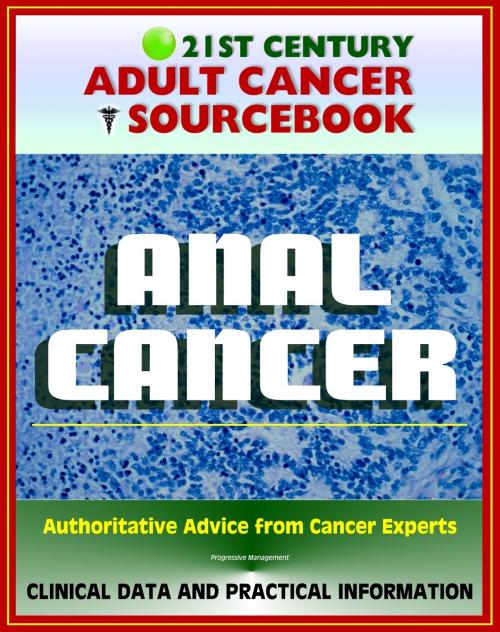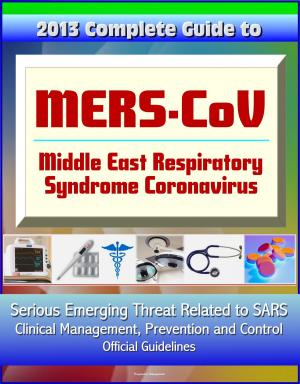21st Century Adult Cancer Sourcebook: Anal Cancer, Cancer of the Anus - Clinical Data for Patients, Families, and Physicians
Nonfiction, Health & Well Being, Health, Ailments & Diseases, Cancer, Medical| Author: | Progressive Management | ISBN: | 9781465705693 |
| Publisher: | Progressive Management | Publication: | September 20, 2011 |
| Imprint: | Smashwords Edition | Language: | English |
| Author: | Progressive Management |
| ISBN: | 9781465705693 |
| Publisher: | Progressive Management |
| Publication: | September 20, 2011 |
| Imprint: | Smashwords Edition |
| Language: | English |
Authoritative information and practical advice from the nation's cancer experts about anal cancer includes official medical data on signs, symptoms, treatment options, surgery, radiation, drugs, chemotherapy, staging, biology, prognosis, and survival, with a complete glossary of technical medical terms and current references. Starting with the basics, and advancing to detailed patient-oriented and physician-quality information, this comprehensive in-depth compilation gives empowered patients, families, caregivers, nurses, and physicians the knowledge they need to understand the diagnosis and treatment of this rare cancer.
Anal cancer is a disease in which malignant (cancer) cells form in the tissues of the anus. The anus is the end of the large intestine, below the rectum, through which stool (solid waste) leaves the body. The anus is formed partly from the outer, skin layers of the body and partly from the intestine. Two ring-like muscles, called sphincter muscles, open and close the anal opening to let stool pass out of the body. The skin around the outside of the anus is called the perianal area. Tumors in this area are skin tumors, not anal cancer. Being infected with the human papillomavirus (HPV) can affect the risk of developing anal cancer.
Overall, the risk of anal cancer is rising, with data suggesting that persons engaging in certain sexual practices, such as receptive anal intercourse, or persons with a high lifetime number of sexual partners are at increased risk of anal cancer. These practices may have led to an increase in the number of individuals at risk for infection with human papillomavirus (HPV); HPV infection is strongly associated with anal cancer development and may be a necessary step in its carcinogenesis.
Comprehensive data on clinical trials related to anal cancer is included - with information on intervention, sponsor, gender, age group, trial phase, number of enrolled patients, funding source, study type, study design, NCT identification number and other IDs, first received date, start date, completion date, primary completion date, last updated date, last verified date, associated acronym, and outcome measures.
Extensive supplements, with chapters gathered from our Cancer Toolkit series and other reports, cover a broad range of cancer topics useful to cancer patients. This edition includes our exclusive Guide to Leading Medical Websites with updated links to 81 of the best sites for medical information, which let you quickly check for updates from the government and the best commercial portals, news sites, reference/textbook/non-commercial portals, and health organizations. Supplemental coverage includes:
Levels of Evidence for Cancer Treatment Studies
Glossary of Clinical Trial Terms
Clinical Trials Background Information and In-Depth Program
Clinical Trials at NIH
How To Find A Cancer Treatment Trial: A Ten-Step Guide
Taking Part in Cancer Treatment Research Studies
Access to Investigational Drugs
Clinical Trials Conducted by the National Cancer Institute's Center for Cancer Research at the National Institutes of Health Clinical Center
Taking Time: Support for People with Cancer
Facing Forward - Life After Cancer Treatment
Chemotherapy and You
This is a privately authored news service and educational publication of Progressive Management. For over a quarter of a century, our news, educational, technical, scientific, and medical publications have made unique and valuable references accessible to all people. Our e-books put knowledge at your fingertips, and an expert in your pocket!
Authoritative information and practical advice from the nation's cancer experts about anal cancer includes official medical data on signs, symptoms, treatment options, surgery, radiation, drugs, chemotherapy, staging, biology, prognosis, and survival, with a complete glossary of technical medical terms and current references. Starting with the basics, and advancing to detailed patient-oriented and physician-quality information, this comprehensive in-depth compilation gives empowered patients, families, caregivers, nurses, and physicians the knowledge they need to understand the diagnosis and treatment of this rare cancer.
Anal cancer is a disease in which malignant (cancer) cells form in the tissues of the anus. The anus is the end of the large intestine, below the rectum, through which stool (solid waste) leaves the body. The anus is formed partly from the outer, skin layers of the body and partly from the intestine. Two ring-like muscles, called sphincter muscles, open and close the anal opening to let stool pass out of the body. The skin around the outside of the anus is called the perianal area. Tumors in this area are skin tumors, not anal cancer. Being infected with the human papillomavirus (HPV) can affect the risk of developing anal cancer.
Overall, the risk of anal cancer is rising, with data suggesting that persons engaging in certain sexual practices, such as receptive anal intercourse, or persons with a high lifetime number of sexual partners are at increased risk of anal cancer. These practices may have led to an increase in the number of individuals at risk for infection with human papillomavirus (HPV); HPV infection is strongly associated with anal cancer development and may be a necessary step in its carcinogenesis.
Comprehensive data on clinical trials related to anal cancer is included - with information on intervention, sponsor, gender, age group, trial phase, number of enrolled patients, funding source, study type, study design, NCT identification number and other IDs, first received date, start date, completion date, primary completion date, last updated date, last verified date, associated acronym, and outcome measures.
Extensive supplements, with chapters gathered from our Cancer Toolkit series and other reports, cover a broad range of cancer topics useful to cancer patients. This edition includes our exclusive Guide to Leading Medical Websites with updated links to 81 of the best sites for medical information, which let you quickly check for updates from the government and the best commercial portals, news sites, reference/textbook/non-commercial portals, and health organizations. Supplemental coverage includes:
Levels of Evidence for Cancer Treatment Studies
Glossary of Clinical Trial Terms
Clinical Trials Background Information and In-Depth Program
Clinical Trials at NIH
How To Find A Cancer Treatment Trial: A Ten-Step Guide
Taking Part in Cancer Treatment Research Studies
Access to Investigational Drugs
Clinical Trials Conducted by the National Cancer Institute's Center for Cancer Research at the National Institutes of Health Clinical Center
Taking Time: Support for People with Cancer
Facing Forward - Life After Cancer Treatment
Chemotherapy and You
This is a privately authored news service and educational publication of Progressive Management. For over a quarter of a century, our news, educational, technical, scientific, and medical publications have made unique and valuable references accessible to all people. Our e-books put knowledge at your fingertips, and an expert in your pocket!















